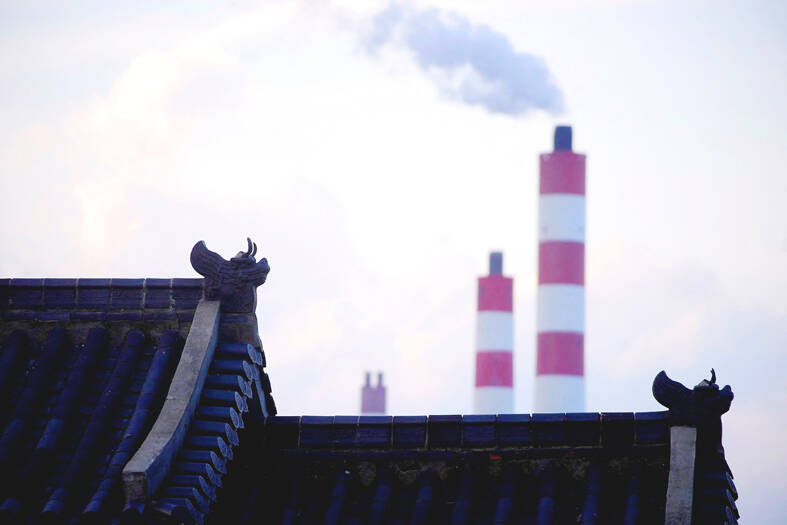China has approved a major surge in coal power so far this year, prioritizing energy supply over its pledge to reduce emissions from fossil fuels, Greenpeace said yesterday.
The world’s second-largest economy is also its biggest emitter of the greenhouse gases driving climate change, such as carbon dioxide, and China’s emissions pledges are seen as essential to keeping global temperature rise well below 2°C.
However, the jump in approvals for coal-fired power plants has fueled concerns that China could backtrack on its goals to peak emissions between 2026 and 2030 and become carbon-neutral by 2060.

Photo: Reuters
Local governments in energy-hungry Chinese provinces approved at least 20.45 gigawatts (GW) of coal-fired power in the first three months of this year, Greenpeace said.
That is more than double the 8.63GW Greenpeace reported for the same period last year, and greater than the 18.55GW that was approved for the whole of 2021.
China relied on coal for nearly 60 percent of its electricity last year.
The push for more coal plants “risks climate disasters ... and locking us into a high-carbon pathway,” Greenpeace campaigner Xie Wenwen (謝雯文) said.
“The 2022 coal boom has clearly continued into this year,” Xie said.
China last year approved the largest expansion of coal-fired power plants since 2015, a Global Energy Monitor study released in February said.
Most of the new projects approved in the first three months of this year were in provinces that have had punishing power shortages due to record heat waves over the past two years, Greenpeace said.
Several others were in southwest China, where a record drought last year slashed hydropower output and forced factories to shut down.
It was unclear how many of the coal power plants approved this year would begin construction.
Greenpeace analysts said that investing in more fossil-fuel plants to prepare for a spike in air conditioning would create a vicious cycle: increased greenhouse gas emissions from the coal plants would accelerate climate change, resulting in more frequent extreme weather such as heat waves.
“China’s power sector can still peak emissions by 2025,” Xie said, adding that emissions released today would linger in the atmosphere for decades.
China is also the world’s largest and fastest-growing producer of renewable energy.
Wind, solar, hydro and nuclear sources are expected to supply one-third of its electricity demand by 2025, up from 28.8 percent in 2020, the Chinese National Energy Administration estimates showed.
However, Greenpeace said the rise in approvals for coal power projects shows how the need for short-term economic growth is diverting investment away from renewable energy projects.
With an average lifespan of about 40 to 50 years, China’s coal plants would be operating at minimum capacity and at a loss if the country delivers on its emissions pledge, the report said.
The China Electricity Council said more than half of the country’s large coal-fired power firms made losses in the first half of last year.

The death of a former head of China’s one-child policy has been met not by tributes, but by castigation of the abandoned policy on social media this week. State media praised Peng Peiyun (彭珮雲), former head of China’s National Family Planning Commission from 1988 to 1998, as “an outstanding leader” in her work related to women and children. The reaction on Chinese social media to Peng’s death in Beijing on Sunday, just shy of her 96th birthday, was less positive. “Those children who were lost, naked, are waiting for you over there” in the afterlife, one person posted on China’s Sina Weibo platform. China’s

‘NO COUNTRY BUMPKIN’: The judge rejected arguments that former prime minister Najib Razak was an unwitting victim, saying Najib took steps to protect his position Imprisoned former Malaysian prime minister Najib Razak was yesterday convicted, following a corruption trial tied to multibillion-dollar looting of the 1Malaysia Development Berhad (1MDB) state investment fund. The nation’s high court found Najib, 72, guilty on four counts of abuse of power and 21 charges of money laundering related to more than US$700 million channeled into his personal bank accounts from the 1MDB fund. Najib denied any wrongdoing, and maintained the funds were a political donation from Saudi Arabia and that he had been misled by rogue financiers led by businessman Low Taek Jho. Low, thought to be the scandal’s mastermind, remains

‘POLITICAL LOYALTY’: The move breaks with decades of precedent among US administrations, which have tended to leave career ambassadors in their posts US President Donald Trump’s administration has ordered dozens of US ambassadors to step down, people familiar with the matter said, a precedent-breaking recall that would leave embassies abroad without US Senate-confirmed leadership. The envoys, career diplomats who were almost all named to their jobs under former US president Joe Biden, were told over the phone in the past few days they needed to depart in the next few weeks, the people said. They would not be fired, but finding new roles would be a challenge given that many are far along in their careers and opportunities for senior diplomats can

Australian Prime Minister Anthony Albanese yesterday announced plans for a national bravery award to recognize civilians and first responders who confronted “the worst of evil” during an anti-Semitic terror attack that left 15 dead and has cast a heavy shadow over the nation’s holiday season. Albanese said he plans to establish a special honors system for those who placed themselves in harm’s way to help during the attack on a beachside Hanukkah celebration, like Ahmed al-Ahmed, a Syrian-Australian Muslim who disarmed one of the assailants before being wounded himself. Sajid Akram, who was killed by police during the Dec. 14 attack, and